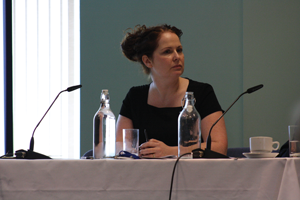NICVA: risks of welfare reform
 Lisa McElherron warns that welfare reform will hit the poorest hardest.
Lisa McElherron warns that welfare reform will hit the poorest hardest.
The welfare reforms currently working their way through Westminster have been widely described as the most radical shake-up of the social security system in over 40 years. With the aim of simplifying the benefits system, improving work incentives to encourage the move from benefits to work and reducing administration costs, the implementation of the changes will impact upon a significant percentage of the working age population in Northern Ireland.
No one can argue that the present overly complicated and bureaucratic social security system doesn’t need to be overhauled. However, there is much more to this than simplification and achieving a better outcome for customers.
A recent report by the Institute of Fiscal Studies found that after London, Northern Ireland will be the hardest hit by the tax and benefit cuts announced and soon to be implemented under the Bill between January 2012 and April 2015. This is for two reasons: the high numbers of those in receipt of Disability Living Allowance, especially for mental health disorders, and the high number of families with children who will be adversely affected by cuts to social security. The loss to Northern Ireland’s benefit recipients will be more than £600 million per year by 2014-2015.
The changes will include existing work related benefits being replaced with a single universal credit, a cap on the total amounts of benefit families and individuals can receive, changes to how housing benefit is calculated, a new benefit to replace DLA which will require all existing and new claimants to undergo a new assessment, the abolition of the independent review of Social Fund decisions and the end of community care grants and crisis loans.
The issues are huge and the potential ramifications for Northern Ireland have yet to be fully understood. Though we do know two things for sure: that these changes will mean less spending power available for the economy and, secondly, that once again the most vulnerable and disadvantaged will bear the brunt of attempts to correct economic problems that are not of their making.
A group of organisations in the voluntary and community sector concerned about the very real potential of these changes to increase poverty, hardship and inequality in Northern Ireland has been meeting to monitor developments and unpick what this will mean for people, families and communities here. Led by the Northern Ireland Law Centre, group members include NICVA, Gingerbread, Save the Children, Barnardos, Advice NI, Disability Action, A2B, the Housing Rights Service, Employers for Childcare and the Women’s Support Network. The group has addressed MLAs and Stormont committees on this issue and has produced a useful overview of the changes proposed in the Bill which is available at www.nicva.org/news
The Bill is expected to receive royal assent early in the new year. Following this the Bill is due to be presented to the Northern Ireland Assembly, which will give our own elected representatives the opportunity to debate the impact of the reforms in Northern Ireland and shape how they are implemented here. NICVA supports the argument from the Welfare Reform Group that the DSD should set out its own arrangements and proposals which are tailored to Northern Ireland’s needs so that a full debate can occur on the practical consequences of any proposal within the Welfare Reform Bill.
In March 2012, NICVA and the Law Centre are joining forces to host a high level conference which will aim to explain and debate the impact of welfare reform in Northern Ireland. Details will be made available as we confirm the agenda and you can get more information by contacting Lorraine Boyd at lorraine.boyd@nicva.org
Lisa McElherron is NICVA’s Head of Public Affairs. For more information:
Tel: 028 9087 7777
Email: lisa.mcelherron@nicva.org





